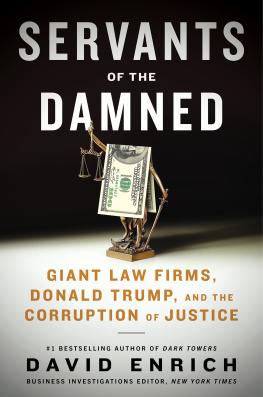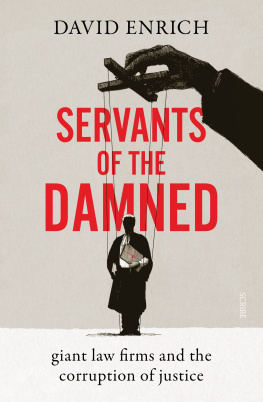David Enrich - Servants of the Damned
Here you can read online David Enrich - Servants of the Damned full text of the book (entire story) in english for free. Download pdf and epub, get meaning, cover and reviews about this ebook. year: 2022, publisher: HarperCollins, genre: Detective and thriller. Description of the work, (preface) as well as reviews are available. Best literature library LitArk.com created for fans of good reading and offers a wide selection of genres:
Romance novel
Science fiction
Adventure
Detective
Science
History
Home and family
Prose
Art
Politics
Computer
Non-fiction
Religion
Business
Children
Humor
Choose a favorite category and find really read worthwhile books. Enjoy immersion in the world of imagination, feel the emotions of the characters or learn something new for yourself, make an fascinating discovery.
- Book:Servants of the Damned
- Author:
- Publisher:HarperCollins
- Genre:
- Year:2022
- Rating:5 / 5
- Favourites:Add to favourites
- Your mark:
- 100
- 1
- 2
- 3
- 4
- 5
Servants of the Damned: summary, description and annotation
We offer to read an annotation, description, summary or preface (depends on what the author of the book "Servants of the Damned" wrote himself). If you haven't found the necessary information about the book — write in the comments, we will try to find it.
Servants of the Damned — read online for free the complete book (whole text) full work
Below is the text of the book, divided by pages. System saving the place of the last page read, allows you to conveniently read the book "Servants of the Damned" online for free, without having to search again every time where you left off. Put a bookmark, and you can go to the page where you finished reading at any time.
Font size:
Interval:
Bookmark:
To Peggy and Peter Enrich, who instilled in me a fascination with psychology and the law.
In memory of Alan Osur, a reliable source of facts, wisdom, and dad jokes.
I came to feel that the American lawyer should regard himself as a potential officer of his government and a defender of its laws and Constitution. I felt that if the time should ever come when this tradition had faded out and the members of the bar had become merely the servants of business, the future of our liberties would be gloomy indeed.
Henry Stimson, secretary of war and state, in his 1947 memoir
From handguns to tobacco, Jones Day defends the powerfully damned and the damned powerful.
American Lawyer magazine, January 2004
The information in this book comes largely from my interviews with more than 180 people. Most were current or former Jones Day lawyers, but they also included judges, opposing attorneys, witnesses, and others who have interacted with Jones Day or had notable experiences with the legal industry. Many, fearful of the professional consequences of discussing a powerful, secrecy-prizing law firm, spoke on the condition that I not identify them as sources. Othersincluding those whom Jones Days leaders authorized to answer my written questionswere on the record.
When faced with conflicting accounts of specific incidents, I used the descriptions that struck me as the most plausible, based on factors including the credibility of different sources. In some cases, I have included dissenting accounts in the text or footnotes.
In addition to interviews, I drew on court documents, oral histories, family scrapbooks, university archives, academic research, many books, and contemporaneous media reports, as well as internal emails, memos, and other materials that I obtained via sources and Freedom of Information Act requests. These are detailed at the end of the book.
Power Play
On a chilly evening in January 2017, shortly before the inauguration of Donald J. Trump, a large crowd gathered in Washington, D.C., for an extraordinary celebration. A procession of judges, senators, congressmen, and conservative power brokers trooped up to the top floor of a neoclassical art deco building near the United States Capitol. The eighty-two-year-old edificeoriginally the headquarters of the Acacia Life Insurance Companywas designed by the same architects behind the Empire State Building. A pair of limestone griffins, each clutching eggs, guarded the twenty-two wide steps that led to the buildings main entrance on Louisiana Avenue. Green marble columns loomed inside the cavernous lobby. Upstairs, the floors luxuriated under twelve-foot ceilings, and wood-paneled offices and conference rooms, some equipped with fireplaces, afforded breathtaking views of the Capitol dome.
The law firm Jones Day occupied the building. Founded in 1893 in Cleveland, it had grown into one of the planets largest legal machines, with thousands of attorneys spread across dozens of offices in the U.S. and overseas. Cleveland had long since faded as a locus of power, which these days resided in Washington. There was no clearer sign of that shift than the men who were being honored this January night: These were the lawyers who were leaving Jones Day to join the new Trump administration, where they would exert tremendous sway over the course of national events.
Jones Days leader was a headstrong, bulldog-faced attorney named Steve Brogan. He was a religious man and the son of a New York City cop, and after faith and family, the law firm was his life. Brogan loved Jones Day, and he wielded unfettered power. He controlled who Jones Day hired, how much employees were paid, where the firm opened offices, and even who would succeed him as managing partner. (Technically, there were a pair of committees that could overrule such decisions, but they had never done so.) Brogan was kingor, as more than a few of his colleagues described him, the godfather.
Brogan very much liked the Acacia. That is one great building, he had gushed shortly after signing the lease. (Jones Day beat out the Securities and Exchange Commission, which also had been eyeing the location.) Brogan ensconced himself in a suite so palatial that a colleague warned him that it would create the impression that Brogan viewed himself as emperor, not a member of a partnership. Brogan kept the office.
Soon after Brogan took over the firm in 2003, Jones Day had set out to greatly enlarge its ranks of Washington lawyers, in keeping with the firmsand the industrysgoverning principle over the past few decades, which boiled down to more lawyers, more offices, more clients, more money, more power.
Thanks to those wonderfully high ceilings, though, there wasnt space in the Acacia to cram in many more lawyers. In 2004, architects and engineers proposed leveling a neighboring parking garage to make way for a gleaming, twelve-story office annex. It would be connected to the Acacia by a triangular, glass-enclosed atrium and a series of translucent skywalks etched with the names of cities in which Jones Day operated.
The plans called for a zoning variance that would allow the new structure to exceed the areas 110-foot height limit by at least twenty feet. This was when the problems began. Law enforcement agencies, still skittish after 9/11, warned that the roof was so high that it could provide snipers with an ideal nest from which to pick off senators. The buildings developers didnt deny that gunmen would have a clear line of sight onto the Capitol grounds; instead, they pointed out that there were plenty of other nearby sites that also would be suitable for assassination attempts. This was a less-than-persuasive argumentsurely, creating additional platforms for snipers was undesirable, even if other options existedbut D.C. zoning bodies approved the plans.
Yet the Capitol Police kept pressing their case. They appealed to individual senators who, the cops emphasized, were the ones who might find themselves in the crosshairs of a rifleman perched on the roof of this sleek new mini-skyscraper. Not surprisingly, senators didnt like the sound of that. In June 2005 the chamber approved a measure that essentially blocked the buildings construction.
Jones Days lawyers thought this was an overreaction. We were told at the time that there were only two sharpshooters in the entire U.S. military who were capable of making that shot, Ray Wiacek, a Jones Day partner who was responsible for handling the firms leases, told me. (He added that Jones Day didnt plan to lease the top floors of the new building and therefore had no dog in this fight. The buildings developers, however, cited Jones Days desire for more space as the reason for the requested zoning variance.) In any case, the developers were outflanked and had to back down. The proposed buildings top floors were lopped off.
Construction finally got underway in 2008, and the finished campus became an appealing synthesis of old and new. Exposed yellow piping accented the stone and steel. All-glass elevators glided through the skylit atrium. Yet the delayed and downsized buildinga product of a defeat at the hands of the political establishmentwas a diminished monument to its primary occupant.
Over the next decade, Jones Day underwent a remarkable metamorphosis that ensured it would no longer lurk on the outside of that establishment, peering in. Soon, the firm wasnt only bigger, though it was that. It wasnt only richer, though it was that, too. It was more powerful, especially where it mattered most: in Washington.
Jones Day had enmeshed itself in the fabric of the capitals conservative firmament. The law firm had always leaned Republican. But lately it had become a champion of right-wing politics, organizing legal challenges to Obamas health care program, white-collar prosecutions, government regulations, and voting rights laws. Then came the 2016 presidential election. Jones Day took a gamble by representing Trump, helping the underdog build credibility in Republican circles and even using the law firms majestic building as a campaign prop. The mastermind was Don McGahn, a shaggy-haired, guitar-playing Jones Day lawyer who, as the Trump teams lead outside counselor, took on a public role advising and traveling with the inflammatory politician.
Font size:
Interval:
Bookmark:
Similar books «Servants of the Damned»
Look at similar books to Servants of the Damned. We have selected literature similar in name and meaning in the hope of providing readers with more options to find new, interesting, not yet read works.
Discussion, reviews of the book Servants of the Damned and just readers' own opinions. Leave your comments, write what you think about the work, its meaning or the main characters. Specify what exactly you liked and what you didn't like, and why you think so.














